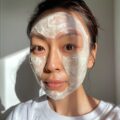What is “Maskitis”?
“Maskitis” is a term being used to describe various skin issues arising from prolonged use of face masks during the pandemic. As masks have become an essential part of protecting ourselves and others against the spread of illness, many people are experiencing skin irritation, rashes, and acne in areas covered by their masks.
Why Does Wearing A Mask Cause Skin Issues?
There are a few reasons why masks may be leading to skin irritation:
- Heat and humidity get trapped under the mask, creating an environment where bacteria, fungi and viruses can thrive.
- The friction of the mask against the skin can cause chafing and inflammation over time.
- Fabrics rubbing on the skin may trigger acne breakouts.
How To Prevent “Maskitis” Skin Irritation
Choose breathable fabrics
Opt for masks made of soft, breathable fabrics like cotton which allow ventilation and minimize rubbing.
Wash regularly
Make sure to wash cloth masks frequently to kill bacteria and prevent buildup of oil and dead skin cells.
Cleanse before and after
Gently cleanse the skin before putting on and after taking off the mask to prevent clogged pores.
Moisturize
Use a gentle, fragrance-free moisturizer to hydrate the skin and reinforce the skin barrier before and after mask use.
How To Treat “Maskitis” Skin Irritation
Use mild cleansers
Cleanse gently with a mild, fragrance-free cleanser to calm inflammation without disrupting the skin barrier.
Spot treat
Use acne spot treatments with salicylic acid or benzoyl peroxide to clear up breakouts without irritating the surrounding skin.
Anti-inflammatory ingredients
See products with soothing anti-inflammatory ingredients like niacinamide, green tea and aloe vera to ease redness and irritation.
Protect with balms
Apply a protective balm or ointment on vulnerable areas before donning your mask to shield skin from friction.
See a dermatologist
Consult a board certified dermatologist if your symptoms don’t improve within 2 weeks of self-care. Custom prescription treatments may help resolve stubborn irritation.
FAQs on Maskitis
What does maskitis look like?
Maskitis can present as red bumps, irritation, rashes, acne breakouts, dryness, flaking and even sores on the parts of the face covered by a mask.
Who is most at risk for maskitis?
Those with sensitive skin or pre-existing conditions like eczema, rosacea and acne are most vulnerable but anyone can experience irritation from prolonged mask use.
Can you prevent maskitis?
It’s very difficult to prevent entirely but focusing on good skin hygiene, breathable fabrics and protective products can help minimize irritation.
Is maskitis contagious?
No maskitis itself is not contagious. The rashes are caused by environmental factors irritating skin under masks rather than any infection.
How long does maskitis last?
With good skincare and limited mask exposure, mild irritation usually clears within 1-2 weeks. Moderate to severe cases may take a few weeks to completely resolve.









